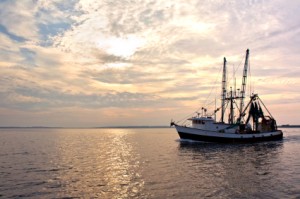In the aftermath of the Deepwater Horizon disaster in April, marine chemist Elizabeth Kujawinski recognized that a technique she had developed for entirely different reasons could readily be adapted to track the chemical components of oil from the spill, as well as the dispersant used to try to clean it up.
Kujawinski brought into play a device with a powerful 7-tesla magnet (seven times stronger than the average MRI) and an intimidating name: a Fourier transform ion cyclotron resonance mass spectrometer, or FT-ICR-MS. It can detect and measure vanishingly tiny amounts of an individual compound in a mixture containing tens of thousands of compounds.
Kujawinski spearheaded the grant proposal to install the FT-ICR-MS at Woods Hole Oceanographic Institution (WHOI) in 2007. Since then she and WHOI colleagues Melissa Kido Soule and Krista Longnecker have been using it to develop highly sensitive analytical methods to reveal the mishmash of organic matter, dissolved in seawater, that supplies food for marine microbes.
In research published online Jan. 26 in the American Chemical Society journal Environmental Science & Technology (ES&T), Kujawinski and colleagues showed that the highly powerful mass spec and their method were also well suited to detect, measure, and definitively identify minute quantities of chemical compounds from the Deepwater Horizon spill, including a compound in the dispersant Corexit. The dispersant has been used often in small amounts on the ocean surface to break down oil clumps and make the oil easier to clean up. But never has so much been used before, and never before has the dispersant been released in the deep ocean.
Read the rest at Oceanus – Woods Hole Oceanographic Institution
Note: Newswire stories are provided as a courtesy of OceanDoctor.org. Content of these articles is provided by external sources.










